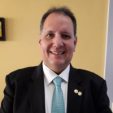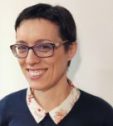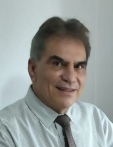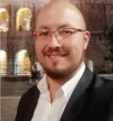
CONFERENCE 1
Topic: Recent advances in AI and its impact on society.Abstract:
Artificial Intelligence is one of the most important areas nowadays. All information related to ChatGPT, Metaverse, digital twins, virtual and augmented reality are part of the worldwide interest. It has become the focus of Governments, International Corporations and an incredible interest at the level of the community in general that wishes to know the scope, myths, realities and the future and trends associated with its development. On the other hand, the same development of technology has created important movements and reflections on the role of teachers in educational environments and the technological tools that can be used to support the process of lifelong learning. This conference is going to present the main techniques of artificial intelligence, the concepts associated with lifelong learning and the potentialities of using Artificial Intelligence techniques in educational environments and the areas that could be strengthened and reinforced with its use.
Speaker: Dr. Francklin Rivas Echeverría.He is a Systems Engineer (1993) from Universidad de Los Andes, Mérida-Venezuela, Master in Control Engineering (1996) and PhD in Applied Sciences (2000). He is a lawyer with Cum Laude distinction (2017). Post graduate program in AI and Machine Learning, Purdue University (2023). He has a Diploma in Administrative Law, another in Strategic Management and Research Methodology. Academic and Director of Outreach at Universidad Técnica Federico Santa María, Chile (2019-2022). Retired Professor of the School of Systems Engineering at Universidad de los Andes. Professor at Pontificia Universidad Católica del Ecuador, Ibarra. Professor at Yachay Tech, Ecuador. Professor at MIU City University, Miami USA. Chief Research Officer at Kauel Inc (USA). Prometeo Researcher (Senescyt, Ecuador) from 2015 to 2016. President of the Organizing Committee of the International Congress COISINT 2016, 2019, 2020.
Professional with extensive in both academic research and hands-on experience in Machine Learning, Data Science and Artificial Intelligence applications and design of solution for its use in diverse areas including: Medical, Industrial, Oil and gas, Educational, financial industry, among others. He has conducted multi‐ disciplinary and multi‐cultural teams in diverse programs and projects (more than 20 R&D projects between universities and industry). He has coordinated international projects and has been working in management positions in educational activities. He has published more than 280 scientific papers in journals, books, and international conference proceedings. He is coauthor of 16 books. Associated Editor (2020-2021) of Elsevier ISA Transactions Journal and has been advisor for more than 80 undergraduate, masters and doctoral thesis. Governance board member of “Academic Partnership for Digital Transformation” between Scotiabank and Universidad Técnica Federico Santa María Project (2019-2022). He has received several international and national awards including recognition awarded by “Revista Gerente” as one of the 100 most successful Managers in Venezuela, Halliburton awarded him a recognition for “contributions and dedication to the development of petroleum technology”, Outstanding Professor award by Universidad Técnica Federico Santa María (2021) and IEEE Senior Member (2022).

CONFERENCE 2
Topic: Textile & Garment Industry focused on circular economy, inclusivity and sustainability.
Abstract:
Since its consolidation as an industrial activity, the Paraguayan textile and clothing sector stands out as one of the most traditional and representative sectors due to its high socioeconomic impact on job creation and has occupied important places on the government agenda in recent years due to its export potential through regimes such as maquila that place the sector as one of the main segments of manufacturing industries.
In order to promote its development and overcome the challenges that arise both in the domestic and regional markets, it is necessary to rethink management models to promote continuous improvement and align with the trends of the global context, with a focus on added value and, above all, on sustainability. At a global level, the main challenge for the future is for the key players in the fashion industry value chain (classified as the second most polluting in the world according to UNTACD data), to recognize that unsustainable growth in production by 2030 and will cause environmental and social pressure to intensify «to the point of threatening the entire growth of the industry.» (Cobbing, Vicaire and Greenpeace; 2018 in Torales, 2021).
To deal with this problem and the need to rethink new management models based on sustainability, in Paraguay since 2019, awareness and information campaigns on the Sustainable Development Goals (SDG) were carried out and the creation of the Sustainable Fashion Seal Paraguay that distinguishes compliance with sustainability criteria by more than 120 brands and companies that have accessed training on sustainability and a total of 52 companies and ventures that have received the distinction of the Sustainable Fashion Seal since the year 2020.
During the presentation, there will be a lecture on the experiences of systematization in the measurement of sustainable impact in the textile and clothing industry of Paraguay, aligned with Sustainable Development Goals and Objectives (SDG): Standards of the Sustainable Fashion Seal Paraguay, success cases and challenges.
Speaker: Msc. Eva Torales de Méndez .Graduated in Textile and Clothing Design, from the Polytechnic and Artistic University of Paraguay (UPAP), Master in Entrepreneurial Development and Innovation (Universidad de Salamanca – Castilla y León – Spain).
Professor of the Bachelor’s Degree in Scenic and Urban Clothing Design «Dra. Olga Blinder» Higher Institute of Art, Faculty of Architecture, Design and Art, National University of Asunción. Has developed her professional internship at the Observatory of Trends in the Textile Area of the National Institute of Industrial Technology (Argentina). Specialized in Product Development and Fashion Business with a focus on sustainability at the Milano Fashion Institute in the city of Milan (Italy). Former ICDF Scholar for the Business Strategies and Applied Digital Skills Course. Taipei – Republic of China (Taiwan).
In the academic field, she has researched and articles on the development of entrepreneurship in the fashion, textile and clothing sector, the history of clothing in Paraguay and impact evaluation reports on learning cycles in clothing clusters in Paraguay with a focus on sustainability.
As a Consultant has experienced as a Sector Specialist for Technical Assistance and Research programs in the field of Business Innovation, Local Development (Handicrafts) and Entrepreneurial Development financed by international organizations such as the European Union, the Italo-Latin American Institute (IILA), the United Nations Program Development Organization (UNDP) and the Technical Mission of the Republic of China Taiwan (Project for Strengthening Capacities and Management System for MSMEs – FOMIPYMES).
Her professional career is endorsed by her more than 7 years of experience as Training and Project Manager of the Industrial Association of Textile and Garment Makers of Paraguay, an organization in which she served as Co-creator of the Sustainable Fashion Seal Paraguay, the only distinctive local and regional compliance of indicators of sustainable standards aligned with the Sustainable Development Goals. (SDG).
She is currently Managing Partner of Innovamos Consulting – a consultancy whose purpose is to promote profitability, innovation and sustainable development of companies and organizations, connecting ideas, talent and knowledge in the areas of marketing, business management (strategies and planning) and management. in sustainability

CONFERENCE 3
Topic: Industry 4.0 oriented maintenanceAbstract:
Nowadays, the integration of the different pillars on which the Industry 4.0 paradigm is based makes it possible to digitize all the tasks related to the life cycle of a product or service from an organizational point of view by collecting, processing and presenting the information obtained from the different parts of the organization. In this sense, maintenance tasks, and in particular the activities related to the analysis of the operating status of the elements of a mechanical system must be reformulated and oriented towards digitization. In this sense, the paper presents a proposed methodology for the integration of digitization within maintenance, as well as the development and use of different disruptive methodologies for the detection and prediction of failures in assets based on operating conditions.
Speaker: PhD. Cristina Castejón Sisamón.She is an Industrial Engineer since 1998 and PhD in the Industrial Technologies program since 2002 by Universidad Carlos III de Madrid (UC3M). Her research career is currently focused on failure detection in rotating mechanical elements oriented to maintenance 4.0 and in the design, modeling and simulation of mechanical systems with different applications (biomedical devices and robotics, among others).
He has 2 sexenios of research, the last one awarded in 2017. He has directed 2 PhD theses in the field of predictive maintenance and modeling of mechanical systems with failure, both with publications in JCR impact journals in the first tercile and awarded one of them as the best PhD thesis by the Spanish association of mechanical engineering. He has published more than 40 articles of which 26 are in JCR impact journals, has 6 book chapters, and has participated with his publications in numerous conferences. He has participated in more than 30 research and development projects at both national and European level, being PI of some of them. The results of his research have led to 8 patents and a software registration. He has done postdoctoral stays at the universities of Cassino, City University of London and Pontificia de Peru.

CONFERENCE 4
Topic: 3D printing of reinforced polymers.Abstract:
Additive manufacturing (AM) by 3D printing, known as fused print manufacturing (FDM), has advanced in recent years, thanks to the development of a new technology to reinforce FDM printing, with thermoplastic filaments. Continuous fiber reinforced thermoplastic composite (CFRTPC) printers are taking this technology to a whole new level in terms of efficient production and mechanical properties. In this work, we characterize the tensile properties of fiber-reinforced specimens, considering the variation of several parameters available during the printing process: fiber orientation, volume fraction, filling pattern, reinforcement distribution. Also, fatigue behavior is studied, since a wide range of dynamic engineering applications can be contemplated in this type of loading. Fatigue tests were performed to analyze the durability behavior of FDM composite materials. The materials shown in this work include a nylon matrix reinforced with continuous carbon (CRTP), Kevlar (KvRTP) and glass fiber (FGRTP) fibers used for the Markforged® printer. Values for, bending and shear are also reported, where the fibers were oriented at 45° from the loading axis. Properties reported include modulus of elasticity, Poisson’s ratio, ultimate stress in the direction parallel to the load and, in some cases, the same properties in the direction perpendicular to the load. On the other hand, volumetric fiber content (Vf) is also estimated using image processing techniques. Vf is necessary to establish mechanical properties of composites using the rule of mixtures or other more advanced prediction models for mechanical properties. The proposed method is tested with images acquired from carbon, Kevlar and glass fiber bundles used in fiber deposition modeling (FDM) in the additive manufacturing process. The study of crack opening and crack propagation in a composite material printed by material extrusion subjected to monotonic loading is presented. The composite material is made of a nylon matrix (with embedded short carbon fiber, called Onyx®) and reinforced with continuous Kevlar fibers. The results were analyzed using linear elastic fracture mechanics parameters using COD and found to have a fracture toughness of 46 MPa√m. Finally, the fracture surfaces are analyzed using SEM microscopy.
Speaker: Dr. Alberto David Pertuz Comas.He is a Mechanical Engineer (1990) and Magister Scientiarum in Metallurgy and Materials Science (1999), degrees obtained at the Universidad Central de Venezuela. He also holds a PhD in Mechanical Engineering from the Université de Lille, France (2003). In the academia he has a wide experience, developed at the School of Mechanical Engineering of the Universidad Central de Venezuela. He has been invited as a Research Associate at the University at Buffalo in New York State. USA (2007-2008) as well as at the Université de Velenciennes et du Hainaut-Cambresis (UCHC) France (2006). Since 2014 he has been a Full Professor at the Universidad Industria de Santander, Colombia. In recognition of his academic and research career, in 2005 he was conferred the José María Vargas order, from the U.C.V (2005). He was also recognized as a Level I researcher by the Researcher Promotion Program of the Ministry of Science and Technology of Venezuela.
Dr. Pertuz has 55 publications in scientific journals. He has supervised master’s and doctoral theses. He is a specialist in Materials Fatigue, as well as in the areas of maintenance and recovery of Machine Elements. He is the creator of a machine to evaluate the multiaxial fatigue of materials, patented in the United States by the United States Patent and Trademark Office.

CONFERENCE 5
Topic: Quality and Efficient Use of Electric Power.Abstract:
This keynote presents the application of a Wind Energy Conversion System (WECS) using a self-excited induction generator (SEIG) coupled to the grid with a Predictive Direct Power Controller (PDPC), applying an optimal space vector selection technique in the inverter bridge. The self-excitation of the induction generator is obtained with a Direct Torque Controller (DTC) which allows controlling the machine’s space vector flux and electric torque. On the other hand, the power system coupling is with a Direct Power Controller (DPC), that selects the voltage space vectors required to minimize the active and reactive power errors to a given reference. The advantage of the optimum DPC scheme proposed in this work is the fast adjustment of the active and reactive powers to the power references. This is achieved without using the classic PLL. This WECS system has been modeled and experimentally proved in an emulator developed in the Universidad Politécnica Salesiana-Cuenca. The tutorial explains and demonstrates the operation and programming of the DPC for grid connection of WECS or PV systems and of the DTC to control the induction generator without self-excitation.
Speaker: Dr. José Manuel Aller.He was born in Caracas, Venezuela, in 1958. He received the Engineering degree in electrical engineering from the Universidad Simon Bolivar, Caracas, in 1980, the M.S. degree in electrical engineering from the Universidad Central de Venezuela, Caracas, in 1982, and the Doctorate degree in industrial Engineering from the Universidad Politécnica de Madrid, Spain, in 1993. He has been a Lecturer at the Universidad Simón Bolívar for 40 years. Actually he is a Lecture in the Electrical Engineer Department at Universidad Politécnica Salesiana in Cuenca-Ecuador, since 2016. He was the General Secretary of the Universidad Simón Bolívar from 2001 to 2005. He was Visiting Professor at the Georgia Institute of Technology, Atlanta, GA, USA, in 2000 and 2007.
He has published more than 130 papers in the field. His research interests include space-vector applications, electrical machine control, power electronics, Photo Voltaic and Wind generation systems and monitoring of electrical machines.

CONFERENCE 6
Topic: Agriculture, biorefineries and food security. A close relationship.
Abstract:
The current concern about the food and Energy supply has occasioned research on different topics to overcome fossil fuels depletion and the risk to food security. According to FAO, onethird of the food produced worldwide is discarded. The depletion of fossil fuels is expected to occur in 2042. It is a short line of time to change the industry. Therefore, alternatives for improving the uses of land for food production have emerged. Precision agriculture is one of them. The use of technology such as multispectral images, data processing, and climatological analysis is used to improve the yield of the crops. Additionally, in this context, biorefineries appear as an adequate alternative in terms, of state of maturity and development, for biofuel production without competing with land and water for food production, using agricultural residues as feedstock.
Therefore, this work has presented the results of implementing precision agricultures on coffee crops in southeast Colombia, in Nariño state. The most representative results, the impact on the community, and the improvement of the quality of the cup test are presented. Furthermore, this methodology is linked with the possibility of biorefining bioprocesses for Energy production to reduce fossil dependency in Nariño State., inside the food security framework. .
Speaker: Dr. Jesús David Coral Medina.He is a chemical engineer with Ph.D studies in bioprocess and biotechnology engineering. Currently, I’m a titular professor of the Engineering faculty of Universidad Cooperativa de Colombia, campus Pasto.
Your research is focused on biorefineries, including solid waste valorization, biomass pretreatment, bioalcohols, biogas, and organic acids productions, including environmental and technical indicators, inside the bioeconomy and green chemistry.
Another research topic that He have been working on since 2016 is the coffee cherries fermentation, focused on secondary metabolites production, metagenomic mapping, and correlation of the sensorial profile with the chemical composition of the fermentation processes.
He is the author of different scientific reports and international conferences in the field of solid waste valorization and energy production. Also, He have served as an international editor of recognized journals and received several national awards.

CONFERENCE 7
Topic: Machine learning applied to time series for prediction of energy consumption in buildings.
Abstract:
Buildings have a dominant presence in energy consumption for the transition to clean energy. During 2020, the construction and operation of buildings globally accounted for more than a third (36%) of final energy used and 37% of carbon dioxide emissions. In the Ecuadorian context, according to the 2020 National Energy Balance, the national consumption in residential, commercial, service, and public administration buildings was approximately 22.1% of the total energy consumption in Ecuador. The primary energy source used by buildings and homes was electricity, representing 57.9%, i.e., 31.7% for the residential group and 26.2% for the commercial, services, and public administration group. This group ranked second in energy demand at the national level. Hence, in the last decade, there has been a great interest in analyzing energy efficiency in buildings from different approaches. Machine learning-based black-box methods are proposed to predict the energy consumption of a university building. These models can be beneficial in predictive control systems considered in buildings to forecast the behavior of buildings’ energy consumption in the short term with outstanding precision.
Speaker: MSc. Julio Barzola Monteses.He was born in Guayaquil. He received his degree in Electronics and Electronics and Telecommunications from Escuela Superior Politécnica del Litoral (ESPOL), Guayaquil, Ecuador, 2007 and the Master’s Degree in Energy Efficiency and Renewable Energy Sources from the University of Rome «Sapienza», Rome, Italy, 2014. Since April 2016 he has served as a full professor at the Faculty of Mathematical and Physical Sciences of the University of Guayaquil (FCMF-UG) and for more than 4 years as General Research Manager of the faculty.
Accredited researcher SENESCYT Agregado 2. He has published more than 30 scientific articles. Director and researcher of research projects. Since 2020 he is a member of the Research Group in Artificial Intelligence and Information Technologies of the UG.
He also serves as an advisor in the Vice Rectorate of Research and Liaison with Society, Universidad Bolivariana del Ecuador. His main interests are in the area of Energy Efficiency in Buildings, Predictive Time Series Models, Machine Learning, Optimization Algorithms, Renewable Energy Systems and Fuel Cell Transport Phenomena. He was vice-president of the Institute of Electrical and Electronic Engineers of Ecuador (IEEE Ecuador). He is currently a senior member and chairs the IEEE Andean Council. He is also pursuing a PhD in Information and Communication Technologies at the University of Granada, Spain.

CONFERENCE 8
Topic: 6GHz and 10GHz frequency bands…For IMT or for connect the Unconnected?
Abstract:
Since 2018, the FCC assigned the segment from 5925 MHz to 7125 MHz for unlicensed use, thinking on the use by WiFi technology. Most countries has chosen this band in the segment 5925 to 6425 or the full band. However, the band, as well as the 10 GHz band are included in the World Radio Conference 2023 (WRC-23) with the aim to identify for IMT use to expand 5G and probably for 6G. Given that during the last 20 or more years, a lot of spectrum has been allocated for IMT and the results in terms of rural and remote locations coverages has been poor, many entities and countries are advocating to keep the 6 GHz and the 10 GHz band to use in different services and specially for connect rural remote areas. In this talk, we will show the current allocation scenarios for IMT in lower bands and discuss the benefits and issues of the allocation for IMT of for Dynamic use in the unlicensed model.
Speaker: Dr. Andrés Navarro Cadavid.Electronic Engineer (1993), with a Master on Technology Management (1999), both from Universidad Pontificia Bolivariana in Medellín. Obtained his PhD in Telecommunications from Universitat Politécnica de Valencia in 2003. He is IEEE member since 1995 and Senior Member since 2014. Advisor of the Spectrum Management Committee for Colombian Spectrum Agency and ITU expert. Currently is the IEEE Comsoc LATAM Regional Director, Comsoc Board of Governors member, Comsoc IT committee member and IEEE Colombia section Chair. As ITU expert, advised different governments in Digital TV and Spectrum Management. Is a participant on recently approved COST CA 20120 INTERACT and former actions COST CA15104 IRACON, COST IC1004 and COST 2100. He is member of IEICE and EurAAP. Participated in the design of Icesi Master program in Telecommunications and Informatics, as well as in the CDIO curriculum design process and ABET process in the engineering school. Currently is the coordinator of the PhD program on engineering and coordinator of the CENIT research center for technology in Health, a joint center involving Biomedica research group and Fundacion Valle del Lili. Director of the i2t research group at Universidad Icesi since 1999. His research interests are Spectrum Management, mobile radio planning, radio propagation and m-health.

CONFERENCE 9
Topic: Representation of Emergencies based on historical data of events attended by the ECU 911 Service, in support of security.
Abstract:
Given the undeniable need to have an efficient emergency response infrastructure, which articulates first response institutions, with cutting-edge technology, in 2012, Ecuador established the ECU 911 Integrated Security Service. It is necessary to highlight the management model implemented articulates immediate response institutions throughout the national territory. Firefighters, Risk Management Secretariat, Military, Police, Health, Municipal Services, and Transportation share efforts, optimize resources, and provide an integrated service to the population of more than 17 million inhabitants. Analyzing the current state of the 911 platform, the challenges of migrating to a next-generation 911 service (NG-911) are presented, all by the guidelines provided by international organizations such as the European Emergency Number Association (EENA) and the North American Emergency Number Association (NENA). The results of the statistical, geographical, and spatial analysis of more than one million emergencies attended by the ECU 911 service are also provided and characteristics and behaviour of each articulated institution are detailed. The results of the application of a simple and significant analysis of multiple correspondences are also analyzed, which allow us to identify the relationship between the emergencies attended and the first response institutions of the Integrated Security Service. All this focused on optimizing the infrastructure installed by the Ecuadorian government to efficiently face the security challenges that constantly change and where new actors appear that require cutting-edge technology to attend to the different types of events that arise. Here, the University plays a vital role in supporting the analysis of existing data to optimize the preventive and immediate response actions of the articulated institutions.
Speaker: Dr. Danilo R. Corral De Witt.In 1992 he reached the rank of Second Lieutenant of Artillery of the Ecuadorian Army, in 2003, with the rank of Captain he graduated as Engineer in Electronics and Telecommunications at the University of the Armed Forces ESPE, between 2003 and 2005 he was head of Engineering of the Telecommunications network of the Joint Command of the Armed Forces and delegate of the Chief of the Joint Command before different commissions in the National Council of Telecommunications (CONATEL).
In 2005 he became a professor at the University of the Armed Forces ESPE in the Department of Electrical, Electronics and Telecommunications, in 2010 he obtained a Master’s Degree in Telecommunications Networks for Developing Countries at the University Rey Juan Carlos of Spain. Subsequently, as an external professional he participated as project manager in the design and installation of 500Km of fiber optic network GPON for the National Telecommunications Corporation (CNT) nationwide, connecting among others, the video surveillance cameras of the ECU 911. ECU 911, this generates a link with the Integrated Security Service ECU-911, where he later served as Deputy Technical Director of Doctrine until 2015. That year he traveled to Canada to start doctoral studies, in June 2019 he obtained the academic degree of Doctor in Information Technology and Communications from the King Juan Carlos University of Spain, and in September of the same year, he achieved the PhD Electrical Engineering at the University of Windsor in Canada.
In 2020 he conducted a Post Doctoral research oriented to the shared use of the radio spectrum and its application to telecommunications for disasters and emergencies in Canada. In order to survive and overcome the crisis caused by COVID 19, he redirected his academic and work activities, linking with technology and electronics companies that supply the automotive industry in North America, specifically in the cities of Detroit in the USA and Windsor in Canada. He is interested in signal research, wireless telecommunications, cognitive radio techniques and telecommunications for disasters and emergencies, CAN (Control Area Nestwork) communications in the internal networks of automobiles and in test systems for assembled circuits for the automotive industry.

CONFERENCE 10
Topic: Deploy AI in space.
Abstract:
The convergence of artificial intelligence (AI) technology and satellite observation has led to significant advances in monitoring and problem solving on a global scale. Star.Vision is a space advanced AI satellite company. They design and build intelligent space machines and use satellites to observe the Earth. Provide with the satellite services and solve the problems they are facing on the ground, such as agriculture, forestry, fishing, mining, post-disaster response, municipal administration and security needs. Star.Vision uses AI’s Rideshare Algorithm to assess crop health, forecast harvests and detect anomalies, detect changes in vegetation cover sustainable urban planning, monitor conflict areas and among other applications in the sea, air and land.
The convergence of artificial intelligence and satellite observation is redefining the way we understand and address global challenges. From agriculture to security, AI-equipped space technology offers innovative solutions that positively impact the sustainability and safety of our planet.
Speaker: Dr. Yashu Kang.He is currently the Chief AI scientist and directs the Research Group at STAR.VISION. He received his Ph.D.from the University of Nebraska and MS from Georgia institute of technology. His expertise lies in deep learning and AI satellite development, remote sensing and spatio-temporal big data analysis. He also serves on the TRB AHB Academic Committee, Advanced Materials Research and etc.